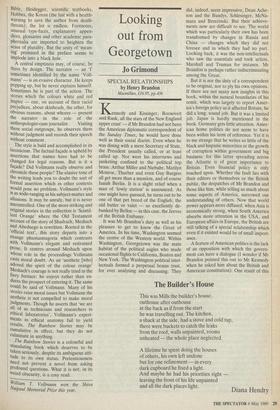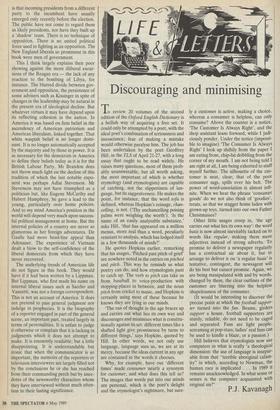Looking out from Georgetown
Jo Grimond
SPECIAL RELATIONSHIPS by Henry Brandon
Macmillan, £16.95, pp.436
Kennedy and Kissinger, Roosevelt and Rusk, all the stars of the New England upper crust' — if Mr Brandon had not been the American diplomatic correspondent of the Sunday Times, he would have done well as their social diarist. Even when he was dining with a mere Secretary of State, the President usually called, or at least called up. Nor were his interviews and junketing confined to the political top brass: Arthur Miller and Niebuhr, Marilyn Monroe, Thurber and even Guy Burgess all get more than a mention, and of course Isaiah Berlin. It is a slight relief when a man of 'lowly station' is announced. As one might have guessed, he turns out to be one of that pet breed of the English, the old butler or valet — so excellently de- bunked by Belloc — in this case, the Jeeves of the British Embassy.
It was Mr Brandon's duty as well as his pleasure to get to know the Great of America. In his time, Washington seemed the centre of the Western world. Within Washington, Georgetown was the main habitat of the political eagles who made occasional flights to California, Boston and New York. The Washington political intel- lectuals formed a perpetual brains trust, for ever analysing and discussing. They did, indeed, seem impressive, Dean Ache- son and the Bundys, Schlesinger, McNa- mara and Brzezinski. But their achieve- ments now are difficult to see. The world which was particularly their own has been transformed by changes in Russia and China — changes which they did not foresee and in which they had no part.
Looking back, it was the non-intellectuals who saw the essentials and took action, Marshall and Truman for instance. Mr Brandon is perhaps rather indiscriminating among the Great.
But it is not the duty of a correspondent to be original, nor to ply his own opinions. If there are not many new insights in this book, within the natural boundaries of his remit, which was largely to report Amer- ica's foreign policy as it affected Britain, he did a long, sound job. But it was a limited job. Japan is hardly mentioned in the book. Germany gets little attention. Amer- ican home politics do not seem to have been within his term of reference. Yet it is to me strange that he writes so little of the black and hispanic minorities or the growth of corruption within government and big business: for this latter spreading across the Atlantic is of great importance to Britain. Even financial policy is only touched upon. Whether the fault lies with their editors or themselves or the British public, the despatches of Mr Brandon and those like him, while telling us much about some aspects of America, narrowed our understanding of others. Now that world power appears more diffused, when Asia is economically strong, when South America absorbs more attention in the USA, and European affairs in Europe, the British are still talking of a special relationship which even if it existed would be of small import- ance.
A feature of American politics is the lack of an opposition with which the govern- ment can have a dialogue (I wonder if Mr Brandon pointed this out to Mr Kennedy when he asked him about the British and American constitution). One result of this is that incoming presidents from a different party to the incumbent have usually emerged only recently before the election. The public have not come to regard them as likely presidents, nor have they built up a 'shadow' team. There is no technique of opposition. There is no united political force used to fighting as an opposition. The New England liberals so prominent in this book were men of government.
This I think largely explains their poor showing against the more illiberal excur- sions of the Reagan era — the lack of any reaction to the bombing of Libya, for instance. The blurred divide between gov- ernment and opposition, the persistence of some advisers such as Kissinger in spite of changes in the leadership may be natural in the present era of ideological decline. But whatever virtues it may have depend upon its reflecting cohesion in the nation. In America it was based on firm belief in the ascendency of American patriotism and American liberalism, linked together. That white waspish belief is no longer domi- nant. It is no longer automatically accepted by the majority and by those in power. It is as necessary for the democrats in America to define their beliefs today as it is for the British Labour Party. Mr Brandon does not throw much light on the decline of this tradition of which the last notable expo- nent was perhaps Adlai Stevenson. Mr Stevenson may not have triumphed as a politician but, like Eugene McCarthy and Hubert Humphrey, he gave a lead to the young, particularly over home policies. And to my mind America's position in the world will depend very much upon success- ful political management at home. But the internal policies of a country are never so glamorous as her foreign adventures. De Gaulle had more head-line appeal than Adenauer. The experience of Vietnam dealt a blow to the self-confidence of the liberal democrats from which they have never recovered.
The underlying trends of American life do not figure in this book. They would have if it had been written by a Lippman. But Lippman, who first made his name on internal liberal issues such as Saccho and Vanzetti, was not a foreign correspondent. This is not an account of America. It does not pretend to pass general judgment nor indulge in prophecies. It is the biography of a reporter engaged in part of the general scene, an important part, treated largely in terms of personalities. It is unfair to judge it otherwise or complain that it is lacking in judgments which it does not attempt to make. It is eminently readable; but a little disappointing. It is understandable but ironic that when the communicator is so important, the memoirs of the reporters or television interviewers are largely filled not by the conclusions he or she has reached from their commanding perch but by anec- dotes of the newsworthy characters whom they have interviewed without much atten- tion to their lasting significance.



















































 Previous page
Previous page